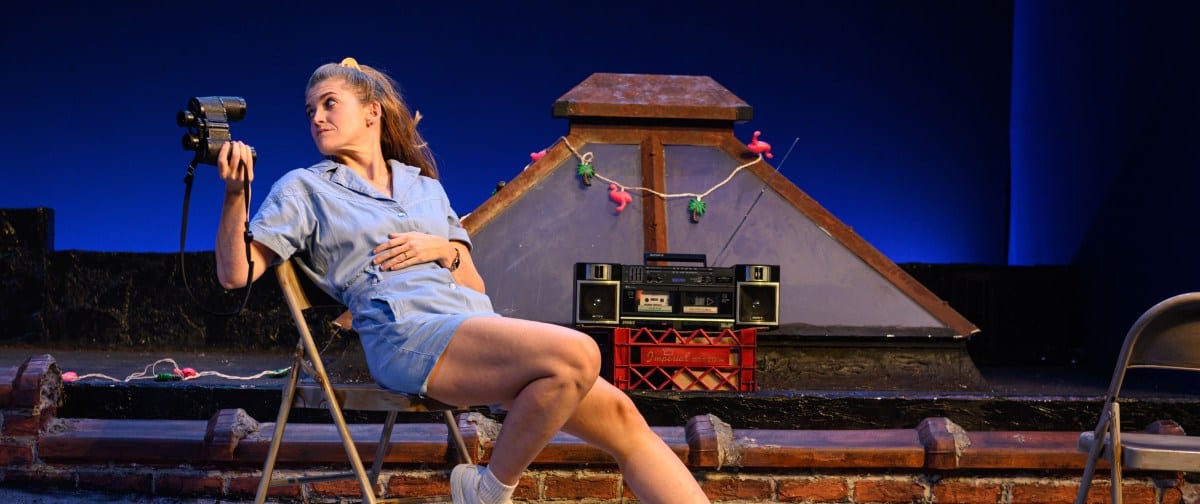A warm summer night on a St. Louis tar beach – the roof of an apartment building overlooking the Mississippi – has two old grad school friends stripping off their waitress outfits, knocking back Budweisers and bantering away, as a clunky old radio declares that astronaut Sally Ride prepares to leave the planet on the Challenger mission. Smoking, laughing, singing, reminiscing, these two are as close as friends can be. As the night progresses, it’s clear their feelings are well beyond friendship.
Set in the conservative 1980s – with Edwin Meese defining pornography and Anita Bryant publicly discriminating against gays and lesbians – America’s gay rights movement was still in its relative infancy, set against the backdrop of the AIDs crisis and the formation of ACT UP. Similarly, this play broaches a queer awakening that happens with a step forward for each step back.
In disarmingly natural patter, Harriet and Matilda talk, bicker, and reveal themselves to be frustrated intellectuals perhaps too tired and cynical to continue their Two Serious Ladies Book Club, which still meets – but books are no longer discussed. Liza Birkenmeier’s script creates two fully formed characters and actors Kristen Sieh and Erin Markey bring them to such vivid life that it borders on eavesdropping.
Matilda is performative and dramatic, but not precisely a drama queen, playing off Harriet’s more seemingly taciturn nature – until a meandering, funny, strange story comes spilling out of her. She recalls getting picked up by a motorcyclist at a hospital down in Florida, and the narrative and events of this story provide the title and the spine of the play. As the details of their evening together trickles out piece by piece, so does Harriet’s story. She has gone down to Florida to see her ailing mother – likely for the last time – and this random encounter brings her deliciously close to her idol, Dr. Ride.
She revels in her awesome power over this strange motorcycle man – even convincing him to shave off his lumberjack beard – but by the time he has given himself over to her, she doesn’t want him anymore. That uneven power play contrasts against Harriet’s relationship with Matilda; their connection runs deep and true. There are no games and no white heat as with the bearded stranger; theirs is slow burn of friendship that could ignite into passionate love under different circumstances.
The stranger Meg (Marga Gomez) arrives on the roof for the book club, serving as a foil to their light antics. A Motorhead-loving lesbian, she brings tone and tension to the conversation and sees the pair as they cannot see themselves. “Do you like Emily Dickinson?”, she asks, the poet serving as a code for latent lesbianism. And it becomes clear as the drama progresses that Harriet and Matilda would rather spend time with each other than their significant others.
Harriet’s worship of Miss Ride – she should rightly be called Dr. Ride – is also a kind of code, as they learn from Meg that Ride is a lesbian (a detail publicly revealed posthumously). The astronaut figures into the finale of Harriet’s story, and also the play’s gorgeously rendered wrap. Here fantasy, fact, longing, and love are imaginatively woven together, as the pair move ever closer to realizing their true selves and their deepest longings.
Norma, played by the venerable actress Susan Blommaert, is a kind of amalgam of all the characters – quirky, headstrong, individualistic, demanding, solitary. Her character’s stilted delivery brings a jarring halt to the gorgeous flow between Harriet and Matilda.
The set details by Kimie Nishikawa are wonderful: leaves puffing out from the gutter, mold around the roof’s downspout, dirty window panes. The 1980s are clear in the main characters’ costumes, and Ben William’s sound design is masterful and subtle: birds, muted car horns. As the night descends and the conversation stops so the players can create an evening rooftop glow from shabby-chic lamps and Christmas lights, the quiet crackles with magic and possibility.

